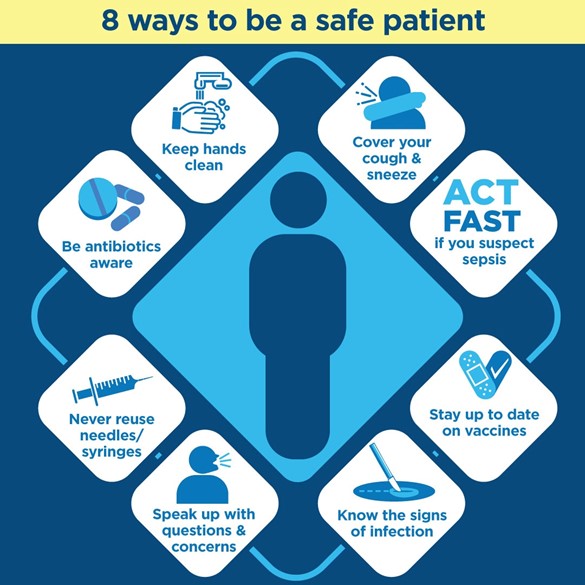When you have surgery, receive dialysis, or visit your doctor, you deserve safe care. Everyone plays a role in patient safety and quality health care. CDC and its partners provide expertise, data, and programs for safe health care to support public health, healthcare workers, patients, and caregivers.
How Can I Be a Safe Patient?
- Speak up. Talk to your healthcare provider about any questions or worries. Ask what they’re doing to protect you from infections.
- Keep hands clean. Make sure everyone, including friends and family, cleans their hands before touching you. If you don’t see your healthcare providers clean their hands, ask them to do so.
- Be Antibiotics Aware. Antibiotics only treat bacterial infections—they don’t work for viruses like the ones that cause colds, flu, or COVID-19. Ask your healthcare professional about the best way to feel better while your body fights off the virus.
- If you need antibiotics, make sure to take them exactly as prescribed and do not skip doses.Talk with your healthcare professional if you develop any side effects, especially severe diarrhea, since that could be a diff infection, which needs to be treated immediately.
- Staying in a nursing home or assisted living facility? As a resident, you may be at increased risk for infections. Learn more about ways to stay safe.
- Act fast if you suspect sepsis. Infections can put you or your loved ones at risk for a life-threatening condition called sepsis. Anyone can get an infection, and almost any infection, including COVID-19, can lead to sepsis. Learn how you and your loved ones can take specific steps to reduce your risk of sepsis and ACT FAST if you suspect it.
Together, We Can Improve Patient Safety
Learn more from CDC and spread the word about how to be a safe patient: https://www.cdc.gov/PatientSafety




